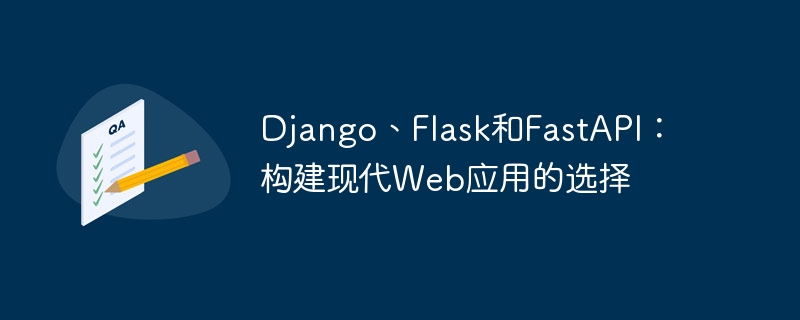Home >Backend Development >Python Tutorial >Django, Flask, and FastAPI: Choices for Building Modern Web Apps
Django, Flask, and FastAPI: Choices for Building Modern Web Apps
- 王林Original
- 2023-09-28 17:41:011632browse

Django, Flask and FastAPI: Choices for Building Modern Web Applications
In today's Internet era, the demand for Web applications is growing day by day. Whether it is an enterprise application or a personal project, choosing a suitable web framework is very important. This article will introduce three commonly used Python web frameworks, namely Django, Flask and FastAPI, and will give some specific code examples to help readers better understand and choose the framework that suits them.
Django is a powerful full-stack Python web framework that provides a package solution, including ORM (Object Relational Mapping), routing system, template engine, user authentication and more. Django's design philosophy is "don't repeat yourself", which advocates keeping code simple and efficient. Here is a simple Django view function example:
from django.http import HttpResponse
def hello(request):
return HttpResponse("Hello, World!")Flask is a lightweight web framework that focuses on simplicity, ease of use, and flexibility. Flask provides the most basic tools and components, allowing developers to freely choose and organize the project structure. The code example of Flask is as follows:
from flask import Flask
app = Flasks(__name__)
@app.route('/')
def hello():
return "Hello, World!"FastAPI is a new generation of high-performance Web framework that emphasizes speed and declarative style. FastAPI is based on the type hint feature of Python 3.7, can automatically generate API documents, and can provide higher performance through asynchronous processing. The following is a simple FastAPI example:
from fastapi import FastAPI
app = FastAPI()
@app.get('/')
def hello():
return {"message": "Hello, World!"}Each of these three frameworks has its own advantages, and you can make a choice based on the project needs and the developer's technical preferences.
If your project requires a full-featured solution, and you value development speed and ease of use, then Django is a good choice. Its powerful features and mature ecosystem improve development efficiency.
If you need a framework with high freedom and flexibility, you can choose Flask. The core idea of Flask is the "micro" framework, which can meet the needs of various projects and can be customized and expanded more flexibly because of its lightweight nature.
If you pursue high performance and excellent development experience, FastAPI is a good choice. FastAPI uses Python's type hint features and asynchronous processing to provide excellent performance, and it has the ability to automatically generate API documentation, making it easier to develop and maintain APIs.
In summary, Django is suitable for large projects, Flask is suitable for small and medium-sized projects, and FastAPI is suitable for high-performance API services. Which framework to choose depends on the size of the project, functional requirements, and the developer's technical background and preferences. No matter which framework you choose, you can improve your development skills through continuous learning and practice, and lay a solid foundation for building modern web applications.
The above is the detailed content of Django, Flask, and FastAPI: Choices for Building Modern Web Apps. For more information, please follow other related articles on the PHP Chinese website!

